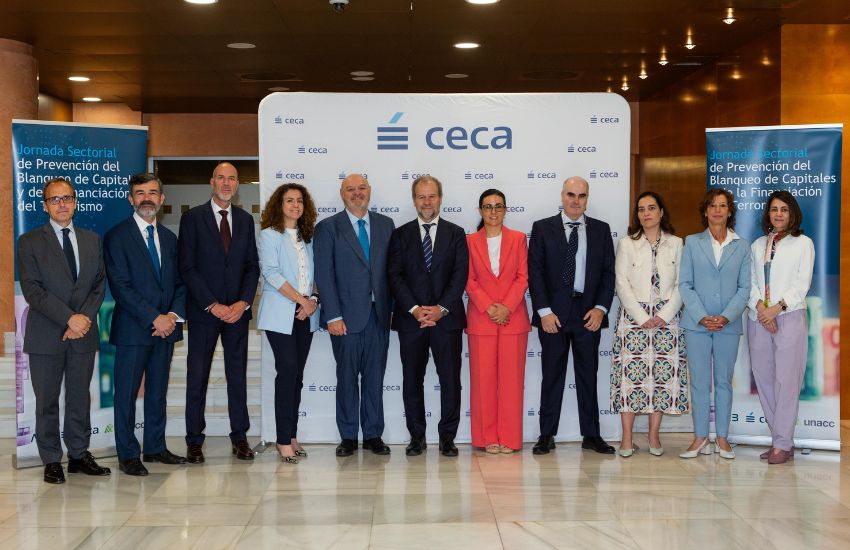Once again this year, CECA, the Spanish Banking Association and Unacc, in collaboration with Sepblac, have organised the 7th Sectorial Conference on Anti-Money Laundering and Countering the Financing of Terrorism
The meeting brought together leading representatives from the Directorate-General of the Treasury and Financial Policy, Sepblac, the Directorate-General for Insurance and Pension Funds, the Bank of Spain, the CNMV, credit institutions, and sectoral associations
The conference seeks to promote dialogue between the private and public sectors to address new developments and issues of interest in the field of AML/CFT
The banking associations CECA, AEB and Unacc, in collaboration with Sepblac, have organised, for the seventh consecutive year, the Sectorial Conference on Anti-Money Laundering and Countering the Financing of Terrorism, which brings together leading AML/CFT experts from the Spanish banking sector, supervisory bodies and regulatory authorities.
The event, held at CECA's assembly hall, aims to promote dialogue between the private and public sectors on anti-money laundering and countering the financing of terrorism. Credit institutions in Spain stand out in particular for their diligence and compliance in collaborating with the authorities in the fight against these crimes, something which has been recognised in reports drafted by international organisations specialising in this field.
The annual conference attracted representatives from almost all the credit institutions belonging to the organising associations, all of them specialised in AML/CFT. This new edition has focused on the main regulatory developments, the latest types of risk and trends in money laundering, the approach to supervision and other topical issues, such as the impact of the new MiCA regulation and the implementation of the new European regulatory package, highlighting the impact of the creation of the new European Anti-Money-Laundering Authority (AMLA), which will be a major challenge for Europe as a whole.
The conference was kicked off by Lourdes Jiménez Ramos, Deputy Director General of Inspection and Control of Capital Movements at the Treasury, who highlighted all the new developments in international financial sanctions, the impact of the new European regulation, the transposition of the Funds Regulation, and the new European AMLA authority, as well as the impact on Spanish prevention regulations, in view of both the legislative package and the new FATF standards.
This was followed by three round tables devoted to supervision, financial intelligence and regulation, respectively, involving representatives from both the public and private sectors.
The first of the round tables was hosted and moderated by Raquel Cabeza, Corporate Director of Risk and Compliance at CECA, and addressed the latest developments and analysis of AML/CFT inspections conducted by the various supervisors. It featured Juan Casillas, Head of the Banking, Securities and Insurance Inspection Unit at Sepblac, Federico Cabañas, Head of the Anti-Money Laundering Group of the Directorate-General for Supervision of the Bank of Spain, José María Díaz Taboada, Head of the Anti-Money Laundering Unit of the CNMV, and Carolina Lameiro Medina, Coordinator of the Subdirectorate-General for Inspection at the Directorate-General for Insurance and Pension Funds.
The second round table, which addressed new developments and challenges in financial intelligence, was moderated by Cristina Freijanes, Secretary General of Unacc. The speakers, Adolfo Bescós, Head of the Operational Intelligence Division of Sepblac, Juan Carlos Calleja, Head of the Strategic Intelligence Division at Sepblac, Juan Alfonso Domenech, Director of Regulatory Compliance at ABANCA, and Francisco Sabe, Head of AML for Financial Crime Prevention at BBVA, addressed different topics such as new types of crime associated with money laundering and the new public-private exchange (PPE) protocol against money laundering and fraud, highlighting the importance and need to continue to design instruments for coordination between authorities and bound parties due to their effectiveness in the prevention of criminal activity.
The third and final round table, moderated by María Peco, Senior Advisor for Legal Affairs and Anti-Money Laundering at the Spanish Banking Association, discussed current regulatory issues in Spain and in the European Union, such as the imminent European legislative package and the future implementation in Spain of the Regulation on crypto-asset markets (MiCA). Other relevant issues were also discussed, such as the new obligation to declare virtual IBANs and the recently published report on sanctions imposed on bound parties. This round table featured Sergio Tresguerres, Deputy Assistant Director of the Subdirectorate-General for the Inspection and Control of Capital Movements at the Treasury, José María Díaz Taboada, Head of the Anti-Money Laundering Unit at the CNMV, Antonio Paredes, Head of the Non-Financial Entities Inspection Division and Head of the Technical Secretariat at Sepblac, and Gemma Serrano, from the Anti-Money Laundering Unit at Caja Rural del Sur.
The sectoral conference was brought to a close with a presentation by Pedro Comín, Director of Sepblac, who concluded by summarising the main topics discussed at each of the round tables and praising each of the experts. 'Public-private collaboration is essential, as is coordination between supervisors. A good example of this is the usefulness of these sectoral conferences so that together we can "close the doors" to criminal organisations', he explained.








